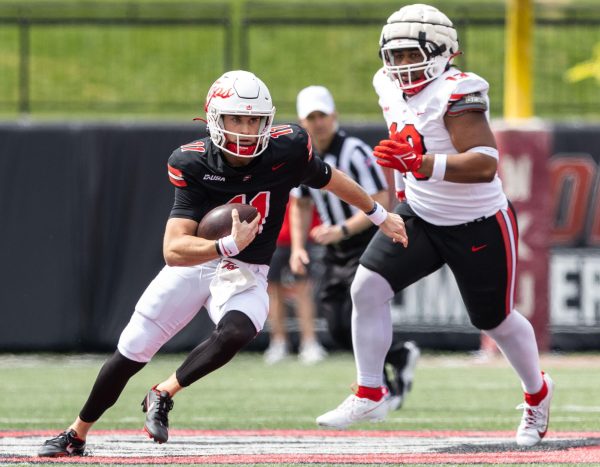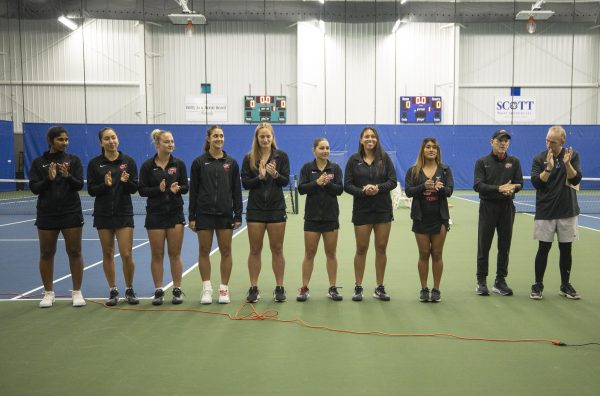Olympic Eats: How Emmanuel Dasor’s Diet Helped Him Achieve His Dream
February 8, 2017
For athletes to be successful, a healthy diet is vital. For senior sprinter Emmanuel Dasor, it’s imperative.
Dasor has experienced success at the highest level. He has competed in the 2016 Rio Olympics, the 2016 World Championships, the World Junior Championships, the African Championships twice, the African Games and the Commonwealth Games. He is also a two-time All-American, and has qualified for two national championship meets.
“Cooking my own meal, making sure everything is fresh from the store, it’s very important,” Dasor said of his eating habits. “When I wake up in the morning, I make tea and eggs with some bread. For lunch, sometimes rice, or some fruits. Sometimes smoothies.”
While he did receive some lecturing from his coaches, Dasor was already pretty disciplined with what he ate when he arrived in Bowling Green in 2013.
“When I came here, my first meeting with my coach, he told me, ‘Hey Emmanuel, no cheese, no ice cream, no cookies,’ and all that,” Dasor said. “And I feel that’s a thing that brings athletes down. They aren’t healthy. I wasn’t interested in eating those things, so I pretty much keep myself off those things and I still don’t eat them.”
Dasor’s diet has always been pretty strict, and that didn’t change for his Olympic pursuit. Head coach Erik Jenkins stressed the importance of a runner’s diet, likening it to gasoline.
“Would you rather have watered down 89 [regular gas], 89, or 93 [high-performance gas]? That is the exact same principle you’re looking at when you’re talking about how you fuel your body,” Jenkins said. “You can put watered down in it, and you’re going to get watered down results. Or you can put 89, which is going to be pretty good. Or you can go 93. You want to put good fuel in if you want high production.”
Jenkins said that at first, he had to inform Dasor on how often to eat. He wouldn’t always eat before practice, and it showed. The coaches want their runners to eat within an hour and a half before a meet or a training session, and within 45 minutes after they finish their performance.
As for his Olympic training, Jenkins has helped him every step of the way.
“When I got Emmauel, even as a freshman, we set goals, Jenkins said. “We said, ‘Okay, well the Olympics are two years out, this is what we need to do.’ Our race plans changed. There’s a different focus when you’re trying to prepare someone for the world stage.”
Dasor said he uses lots of fruits in his smoothies because he prefers natural ingredients. He prefers to make his own food, but there’s one specific snack he’ll get from a restaurant if he’s out.
“I don’t trust outside food,” he said. “I trust my own food because I made it myself, I know the kind of things I put in there. When I’m running very late I sometimes eat out, but most of the time it’s like Chick-Fil-A fries.”
That devotion to a healthy diet helped Dasor qualify for the Olympics in the 200-meter dash, as he beat the qualifying time of 20.50 seconds with .01 second to spare, running a 20.49.
That got him into Rio, an experience he treasures.
“As a kid I used to watch the Olympics and my friends were telling me, ‘Oh, you can go to the Olympics,’ but I didn’t believe in myself,” the 21-year-old Ghana native said. “When I finally had the chance, which was last year, I told myself, ‘I’m going out there to see all the superstars that I see on TV, and we’re going to be there together.’ My first day in Rio, when I went to go eat, there were a lot of superstars. Michael Phelps, everybody, were all in, like, one hall eating.”
That was when Dasor knew he had achieved his Olympic dream.
“I just said ‘Wow. So my dream has finally come true.’ Me working hard for these past eight years just to go to the Olympics has finally paid off, and I’m sitting out here with these superstars eating at the same table. It was a privilege and I thank God for that,” Dasor said.
The discipline in Dasor’s customary eating habits that has helped him reach the dreams most runners strive for doesn’t quite exist in the diets of all of his Hilltopper teammates.
Take senior sprinter and jumper Ventavius Sears, for example, who has a very unusual daily eating routine for a track and field athlete.
“On an average day, I’m almost embarrassed to say,” Sears said. “I eat a lot of candy. I don’t eat the typical healthy breakfast to get my day started. I’ll eat like some cookies or something, some crackers. But on a good day, I’ll eat some pancakes. I love pancakes. Breakfast is really the only meal I eat; I guess you could say. I eat breakfast all the time.”
Holding back laughter, Dasor wasn’t shy about adding that Sears eats Waffle House all the time, and that’s not the only restaurant he’ll eat at.
“I like Ruby Tuesday,” Sears said. “I’m not a big fan of trying different foods, but I’ll eat something healthy, it’ll be like pasta, like shrimp alfredo. I’ll eat that every day.”
Despite their differences in diet, Sears and Dasor have been leading by example on the track during their time at WKU. In June, 2016, along with junior sprinters Kyree King and Julius Morris, Dasor and Sears helped the Hilltopper 4×100 relay team set a school record with a time of 38.60 which was good enough for a fifth-place finish at the NCAA Championships.
While the pair of seniors’ relay and individual times may fluctuate in practice and at meets, neither of their diets do.
“I don’t change my diet because of a track meet, if that makes sense,” Sears said. “I usually do the same stuff I do throughout the week because I feel like that’s what my body’s used to, so I just personally don’t change it. Should I change it? I mean, maybe. It’s not as important to me as it should be.”
Sears diet may not be as structured as it could be, but it hasn’t barred him from being a successful runner. He’s been named an All-American, and has also qualified for two national championship meets.
Over the course of nearly four years together on the Hill, Dasor and Sears have built a friendship that extends beyond the track.
“That’s a funny dude,” Sears said of Dasor. “Outside of track and field, he’s a really good guy.
“I like to be around him at track meets because he knows a lot of people from a lot of different countries in Africa and Europe. It’s just always fun to be around him because he really shows me different cultures. He introduces me to a lot of people that aren’t like me, and it really starts great friendships.”
Dasor will continue his strict diet, with the hope that it brings him more Olympic appearances.
Reporter Jeremy Chisenhall can be reached at 859-760-0198 and [email protected]. Follow him on Twitter @JSChisenhall























